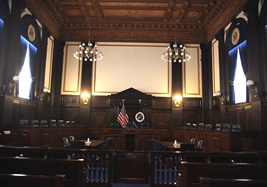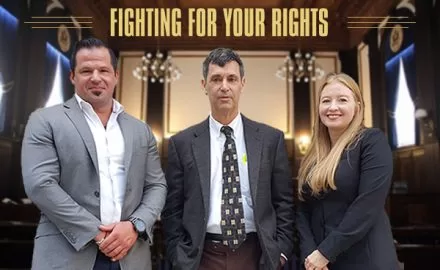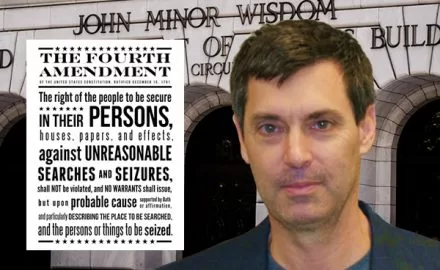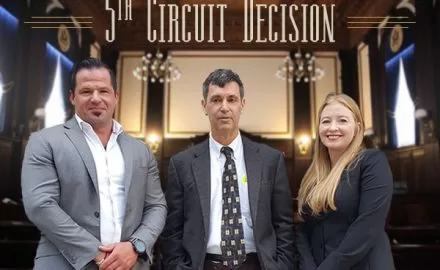UPDATED 11/3/2017
By Ron Lee & Alicia Wells
Investigative Journalists
New Orleans, LA – The dinner party must have looked like any other casual gathering to the staff of the Grill Room, the restaurant inside the Windsor Hotel in New Orleans. Little did they know, several of the guests were part of a legal case to be argued the very next day in front of the 5th Circuit Court of Appeals. It’s a case that seeks to protect the public’s 4th Amendment right, wherein, “…no Warrants shall issue, but upon probable cause, supported by Oath or affirmation, and particularly describing the place to be searched, and the persons or things to be seized.”
Michael Minns, the renowned defense lawyer of Minns & Arnett, who has more wins against the federal government than most others could hope for in their lifetime, was hosting the event with his law firm partner Ashley Arnett after a long preparation.
Minns had been scheduled to take his grandchildren to Sea World on the date the 5th Circuit ultimately chose for the oral argument. Instead, his family opted to come watch history unfold, and traveled with him to the Birthplace of Jazz. More than anything, you could feel how important family is to Minns, having them there obviously meant the world to him.
Minns stood and spoke. His voice was cracked and tired, but his resolve was not. He praised his children and grandchildren, and introduced a kind woman who followed many of his cases. He then spoke of Justin Smith, his client, and the loss he’d been made to endure at the hands of a government who is supposed to value above all else that we are all innocent until proven guilty if faced with criminal charges. As Minns succinctly pointed out, Smith was treated as neither innocent, nor had he been charged with a crime. The government had simply ruined Smith, and no one knew why. No one could know because the government hid their motives behind sealed search warrant affidavits.
In essence, the government needed to convince a magistrate judge that a search warrant was necessary and they had to provide it in writing in a sworn statement. These statements are the pre-indictment search warrant affidavits. Being that they are sealed it keeps anyone from seeing if there were false statements made in order to gain a search warrant to begin with.
Minns laughed a little bit, “In the old days, when a warrant was served, the affidavit was served with it. Now, it’s a knee-jerk reaction to seal them all, especially in every tax case.” His chuckle turned serious, “In America you should have the right to know why the government is raiding your home, or business and maybe putting guns to your employees’ heads. You should be able to see if what was sworn to was a lie or not. If it was a lie, then somebody is responsible.”
The 4th Amendment
For the next little while Minns educated the gathering on the importance of the 4th Amendment; that without it the government could virtually imprison you at will, and that the system has eroded its protections to a point where every citizen should be frightened. Apparently, in the 9th Circuit (which includes California, Nevada, Oregon, Washington, Alaska, Arizona, Idaho, Montana and Hawaii) there has been no right to see these pre-indictment search warrant affidavits since 1989! That means the government gets to say whatever it wants in order to secure a pre-indictment search warrant against you, and you never get to see it! If they lied, you never get to know. Frankly, that needs to change. Speaking about the issue at hand Minns stated, “This case deals with the plethora of cases where a citizen is never formally charged. It might be the raid of their home, it might be simply grabbing their luggage at an airport, or a truck stop, … and if they are not charged with a crime, the government often keeps their property without recourse forever. Most of the time citizens do nothing because the cost of trying to get the property back is too expensive, and the citizen is just grateful not to be charged with anything. Smith chose not to accept that. And he was fortunate enough to find me to advocate for the principle.”
As the night continued, Smith talked about the losses he’d incurred. That at one point, after losing his home, he only had a few dollars to his name. It became apparent that Minns wasn’t collecting a fee for his representation; that there was something deeper driving him.
Soon, Minns proclaimed his need to go over his note cards and prepare his remarks, which needed to be perfectly refined for the ten minutes he was allotted to present his case.
On his way out, Minns thanked the US~Observer for being the only media to send reporters to cover such an important issue.
The mood shifted as everyone began to disband, each walking out resolved and hopeful that Michael Minns would triumph in the 5th Circuit Court of Appeals on the 4th Amendment issue of sealed search warrant affidavits.
The early morning court appearance came quickly.

Walking into the 5th Circuit Court to see a case put on before the judges is something every American should experience. If not for the appreciation of the sheer beauty of the marbled floors and molded ceilings, do it for the overpowering awe and intimidation the court impresses upon you. Sitting in the pews, there are only maybe 4 to each side, one can tell this is not a place for frivolous matters; from the dark wooden eagle carvings that reside by every high window, to the large stand where the judges will preside, all is set as if to look down upon any who would approach. By design it makes you small to the power of the court before you.
Minns, Arnett, and the government attorney, Carmen Castillo Mitchell, walked through the wooden gated area that was reserved for counsel. Minns approached Mitchell, shaking her hand and asking about her family, whom she had brought to the proceedings. After the brief yet sincere pleasantry, Minns made his way back to his table. There they sat reviewing their cases in absolute silence except for the occasional page turning. Mitchell, seemingly confident this would be a short and easy win, periodically turned to smile and wave at her family.
All are called to stand as the judges enter the room. Judge E. Grady Jolly, Judge Jennifer Walker Elrod, and Judge Xavier Rodriguez take their places above all others. All present silently wonder what new atmosphere the attitudes of three judges will bring.
Minns is called to present his case. In the first few seconds of his opening statement, Judge Elrod rains questions down upon him as if he were being interrogated. Unflustered, Minns went to work (click here to listen to the full Oral Argument).
It is amazing what happens in ten minutes. Not just the ten minutes that Minns led the justices on a case-by-case and circuit-by-circuit review of the issue at hand, but the ten minutes where the government’s attorney tried to keep from answering the pointed questions asked by the justices. There was no excuse offered for taking more than a year without there being an indictment against Smith, nor was there any apparent desire to see Smith as anything other than a criminal in her eyes, to whom she had no reason to give a preponderance of innocence.

It was grossly apparent in Mitchell’s family, as well. It seemed as if they believed their mother could do no wrong, and that every case she argued was righteous. You could see it in their sneers and snickers while pointing over toward Smith’s side of the courtroom. Perhaps it would be too difficult for them to know that government agents make mistakes or just don’t care to follow the rules; that innocent people become suspect and prosecuted; that those lives are thrown away into the abyss that is the justice system. But, how could they face her if they knew she knowingly disregarded the rights and the lives of every day citizens just like them – all for the sake of a prosecution?
In 20 minutes, it was over. Twenty-one days later, the court would hand Minns, Smith and every citizen living within the 5th Circuit a victory for the 4th Amendment. The affidavits could be unsealed upon further findings of the lower court.
The victory, was however short lived.
Ten days after the ruling, on August 31st, the government filed for an extension to file for a rehearing. The government has until October 19th to file its petition.
Obviously, they will fight tooth and nail to keep their secrets, much to the detriment of Justin Smith, who is quite literally fighting for his life, and all other citizens who may find themselves targeted by the government.
Smith has himself a ringer, though.
Minns is an old school boxer. When you think he’s tired, or you have him on the ropes, be prepared to get hit hard and go a few more rounds. As he said when discussing the case, “Make no mistake about it, the constitutional principle is so important to me that I will fight for it all the way.”
With many more than one win under his belt, our money is on Minns to champion this fight for the rights of every citizen.
UPDATE: After several filings for extensions, on November 2, 2017, US Attorney Carmen Castillo decided to end the fight on the 5th’s ruling.
Lawyer Michael Minns matter-of-factly stated, “Smith case ends today. Feds threw in the towel with six hours left to go to file their brief. At 5:00 pm. US v. Smith becomes the law of the Fifth Circuit for the balance of our lifetime.”
Editor’s Note: For more details on the Justin Smith Case start here.
Michael Minns and Ashley Arnett, thank you. Thank you for fighting for our constitutional rights, especially for your work protecting the 4th Amendment, and believing that Justin Smith, along with all people, deserve just treatment.















